The hospitality industry has always been about creating memorable experiences. But as technology reshapes the way hotels, resorts, and restaurants operate, the guest experience is no longer driven by intuition alone. Today, it’s shaped by systems — interconnected networks of people, processes, and technology designed to deliver seamless service. This is where engineering principles, especially system design, come into play. Understanding how systems function, interact, and improve over time can help future hoteliers design operations that are not only efficient but also deeply human-centered.
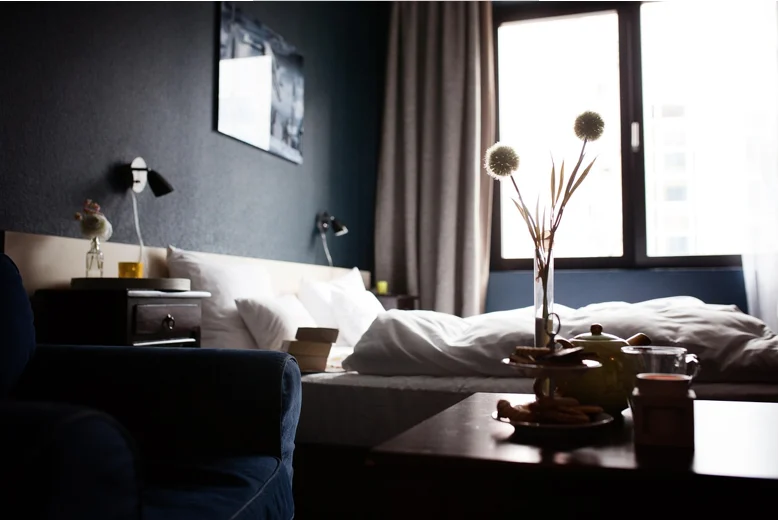
At schools like SHMS – Swiss Hotel Management School, students are learning that hospitality is no longer just about service etiquette or event management. It’s about integrating strategic thinking, technology, and design — much like an engineer would. The concept of system design provides a framework that helps hospitality professionals understand the complex mechanics behind guest satisfaction and organizational success.
What Is System Design — and Why It Matters in Hospitality
In engineering, system design refers to the process of defining the architecture, components, and relationships of a system to meet specific goals. Engineers break down large, complex problems into smaller, manageable parts and ensure that every component works together efficiently.
To engineers, a complex operation is often viewed as a ‘black box’ system. Let’s visualize how this fundamental engineering model applies directly to hospitality management.
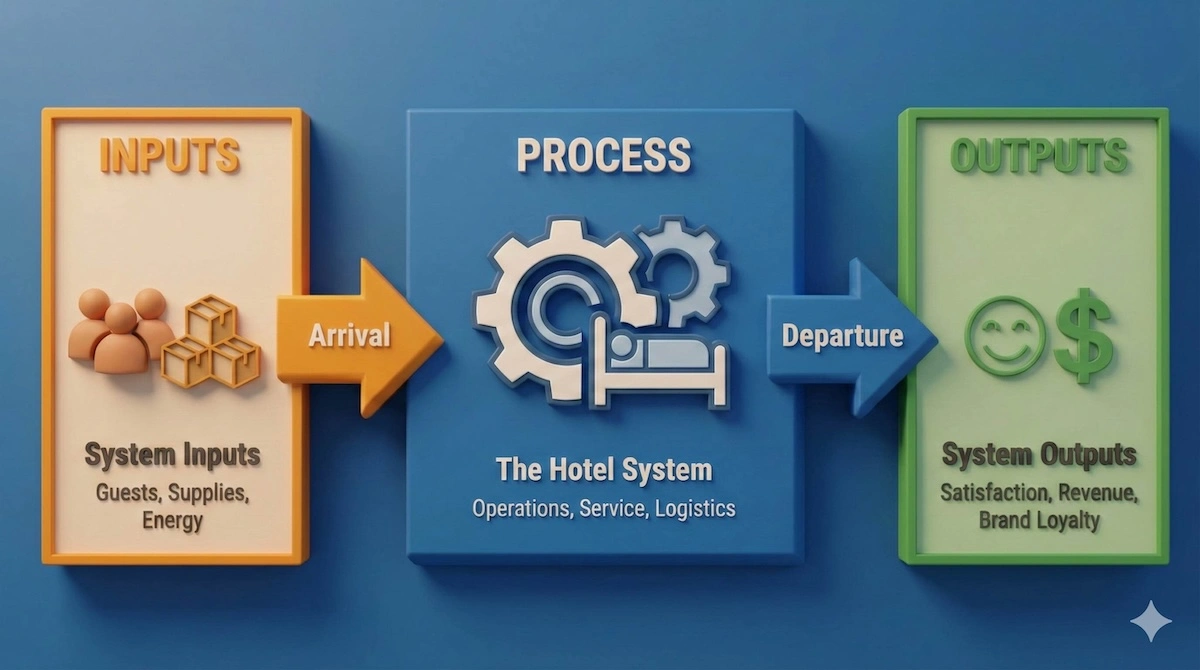
Viewing a hotel as an engineering system helps identify how inputs are transformed into the final guest experience.
By treating the hotel as a processing engine, we can isolate exactly where value is added and where inefficiencies leak out.
In hospitality, this same mindset applies to how hotels or restaurants function as living systems. Every touchpoint — from online reservations to room cleaning and guest feedback — is a part of a larger operational network. When one element fails, the guest experience is affected. Viewing hospitality through the lens of system design allows managers to anticipate issues, streamline processes, and maintain consistency in service quality.
For instance, check-in is not just a transaction; it’s a system involving reservation databases, staff communication, payment processing, and guest data management. By analyzing these elements as interconnected parts, hospitality managers can identify inefficiencies, reduce wait times, and ensure a more personalized welcome for guests.

Engineering Principles That Improve Guest Experience
1. Efficiency and Optimization
One of the most direct applications of engineering thinking in hospitality is process optimization. Engineers are trained to find the most efficient way to achieve results with minimal waste — whether that’s energy, time, or resources. Hotels can adopt similar practices.
For example, optimizing housekeeping schedules based on occupancy patterns can reduce downtime and improve resource allocation. Restaurants can use kitchen workflow analysis to reduce food waste and service delays. These improvements don’t just save money; they also enhance the overall guest experience by ensuring that operations run smoothly behind the scenes.
Doubling the staff doesn’t always double the speed, a phenomenon explained by Queuing Theory. This graph demonstrates the critical trade-off between resource cost and guest wait times.
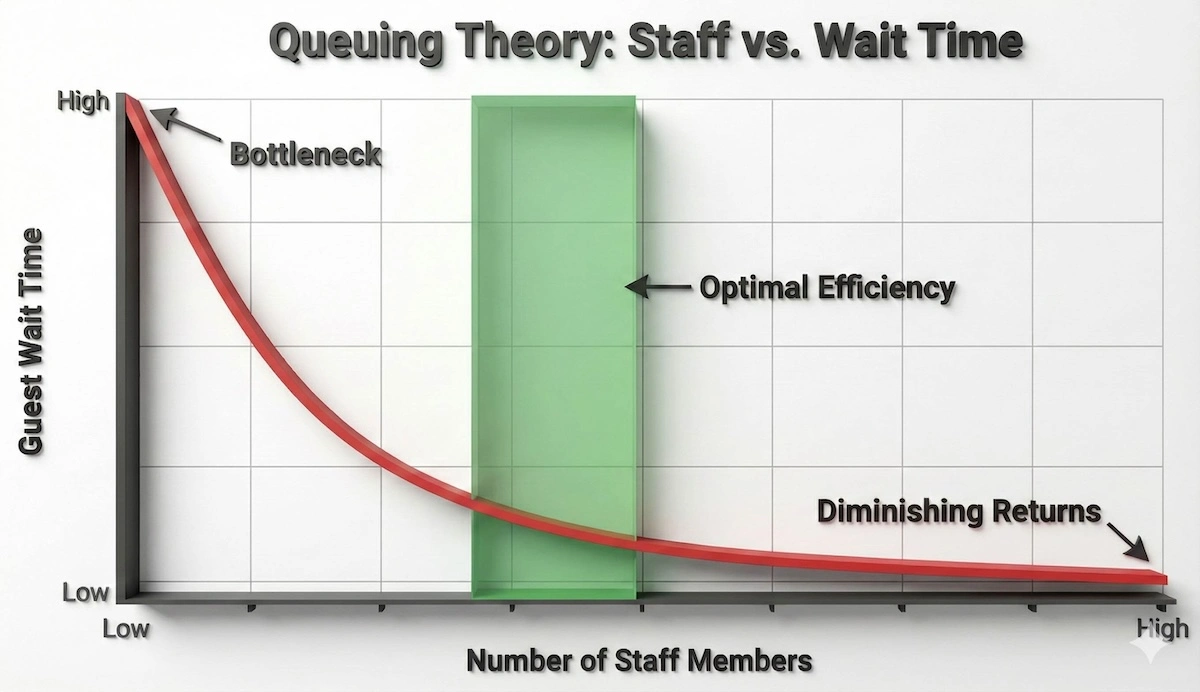
Queuing theory shows that adding staff reduces wait times drastically at first, but eventually hits a point of diminishing returns.
optimization zone’—this is the sweet spot where you maximize guest satisfaction without overspending on idle staff.
2. Feedback Loops and Continuous Improvement
A cornerstone of system design is the feedback loop — the process of measuring outcomes and using that data to make improvements. In hospitality, guest reviews, surveys, and social media feedback serve as powerful feedback mechanisms.
Instead of reacting to complaints individually, hospitality managers can analyze feedback trends to make systemic improvements. If multiple guests mention slow service during breakfast, the issue might not be with one staff member but with scheduling, kitchen flow, or communication systems. By identifying and addressing these patterns, hotels can continuously refine their service delivery.
This process creates what engineers call a ‘Closed Loop Control System.’ The flowchart below illustrates how guest complaints function exactly like a sensor in a thermostat
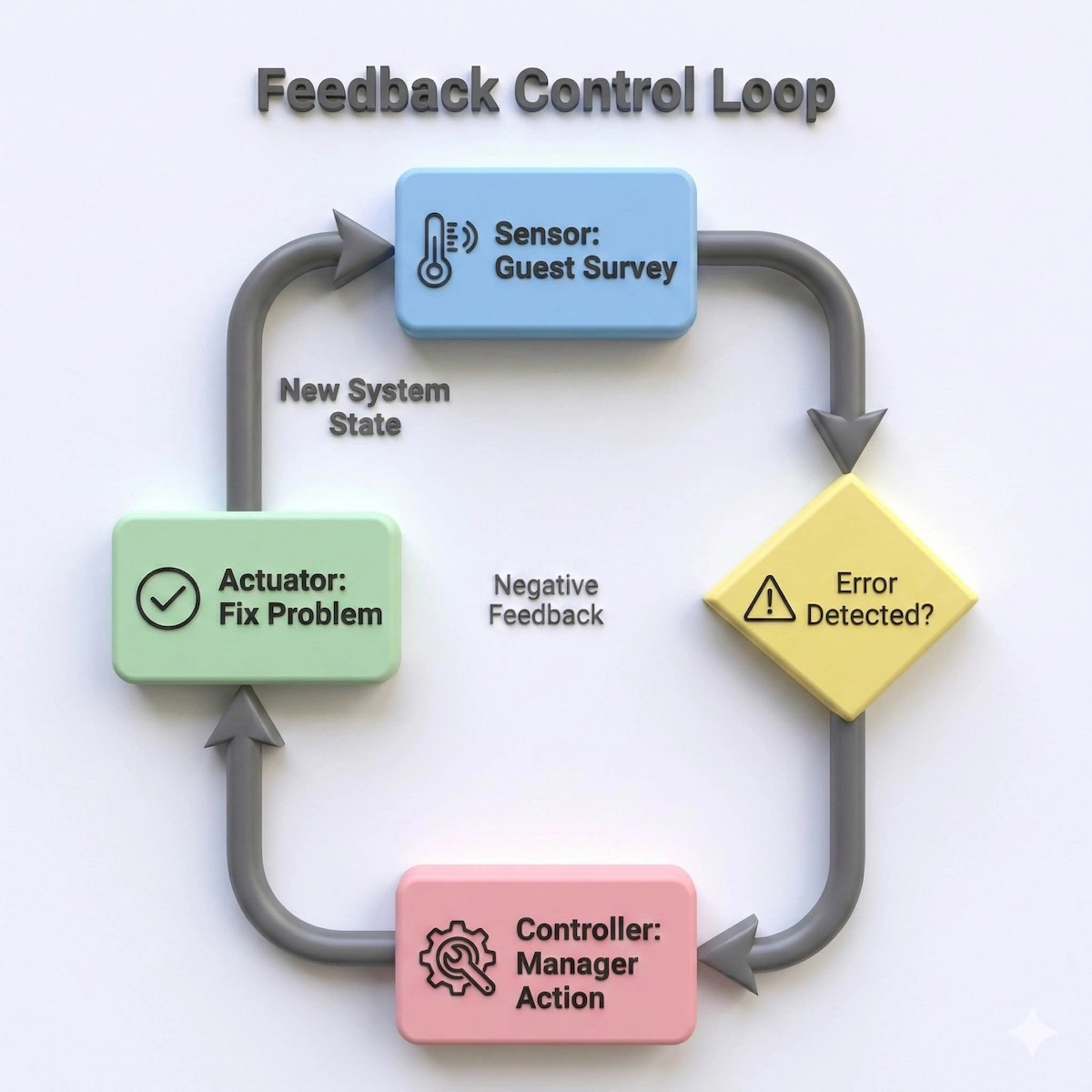
Just like a thermostat controls temperature, guest feedback acts as a sensor to trigger management corrections and stabilize the system.
Without this continuous feedback loop, the system drifts into error—resulting in unhappy guests and damaged reputation.
3. Data-Driven Decision Making
Just as engineers rely on data to evaluate system performance, modern hospitality leaders use data analytics to make informed decisions. Data from booking systems, customer relationship management (CRM) tools, and property management systems (PMS) can reveal valuable insights into guest behavior and preferences.
At SHMS, students learn to interpret such data to enhance operational efficiency and personalize guest interactions. For instance, predictive analytics can forecast demand peaks, allowing hotels to adjust staffing levels and inventory in advance. This proactive approach ensures a smoother guest experience while maintaining operational balance.
4. Redundancy and Reliability
In engineering, redundancy means building backups to prevent failure — an approach that applies well to hospitality. A well-designed system includes contingencies so that if one part fails, the overall service remains unaffected.
Hotels can apply this by ensuring backup internet connections, secondary suppliers for essential materials, or cross-trained staff who can step in during emergencies. Reliability builds trust, and guests notice when a hotel consistently delivers without disruption.
Reliability engineering relies heavily on redundancy to prevent catastrophic failure. Here is how standard technical fail-safes translate directly into hotel operations.
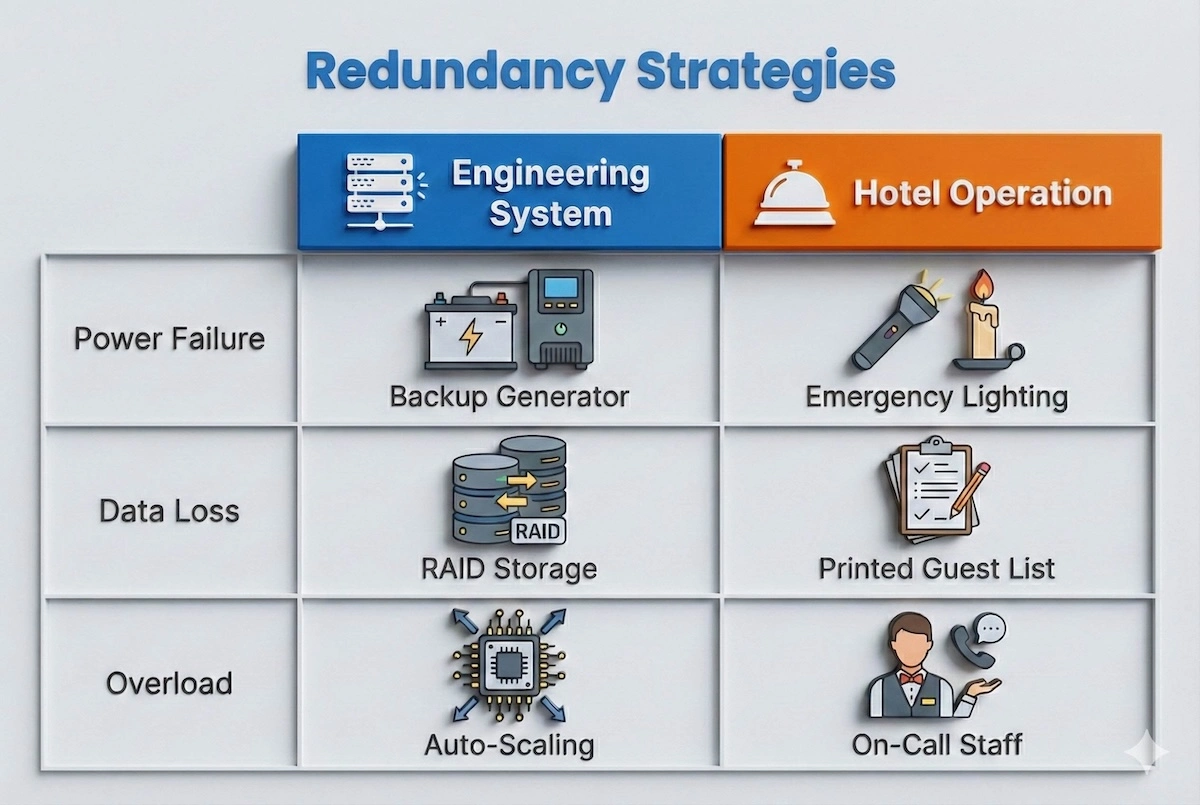
Building redundancy into hotel operations mirrors engineering fail-safes, ensuring the “system” keeps running even when components fail.
Just as a server farm needs backup power, a hotel needs backup protocols to ensure the guest experience never crashes.
Real-World Applications of Engineering in Hospitality
Many of the most successful hospitality innovations today are grounded in engineering principles. Smart hotels are integrating the Internet of Things (IoT) to monitor lighting, temperature, and security automatically, adapting to guest preferences in real time. Predictive maintenance systems use sensors to alert staff before equipment fails, minimizing downtime and enhancing safety.
Engineering also plays a critical role in sustainability — an area that hospitality students at SHMS explore deeply. Energy-efficient designs, water recycling systems, and smart energy management reduce environmental impact and operating costs. These initiatives are not just technical solutions; they represent a new mindset of responsible, data-informed leadership in hospitality.
Thinking Like an Engineer: A Skill for Future Hoteliers
Hospitality management has traditionally emphasized soft skills like communication, empathy, and leadership. While these remain essential, the future of hospitality requires analytical and technical literacy as well.
Learning to think like an engineer means adopting a systems mindset. Future hoteliers should learn to visualize processes, map workflows, and analyze how different components — technology, people, and policies — interact. Tools like flowcharts, process diagrams, and cause-and-effect analysis can help managers identify weak points and improve performance systematically.
At SHMS, this blend of creativity and analytical thinking is already part of the curriculum. Students learn not only how to delight guests but also how to design, measure, and optimize the systems that make those moments possible.

The Future of Hospitality Innovation
The next generation of hospitality leaders will operate in an increasingly digital environment. Artificial intelligence is already transforming how hotels communicate with guests, offering personalized recommendations and real-time assistance. Robotics is being used for cleaning, concierge services, and luggage delivery. Augmented reality may soon help guests explore amenities before they arrive.
All these innovations depend on system design — ensuring that new technologies integrate seamlessly with existing workflows and guest expectations. For hospitality professionals, this means understanding both the technical and human sides of service delivery.
Collaboration between hospitality institutions like SHMS and engineering communities such as MyEngineeringBuddy creates opportunities for cross-disciplinary learning. The My Engineering Buddy website provides practical insights, case studies, and resources that help bridge the gap between technical systems thinking and hospitality management. Aspiring hoteliers can use My Engineering Buddy to explore how engineering frameworks apply to guest experience design, sustainability, and process improvement.
A perfect guest experience relies on abstraction—hiding the complexity of the machinery. This diagram visualizes the ‘Visibility Line’ that separates the serene guest experience from the chaotic operations.
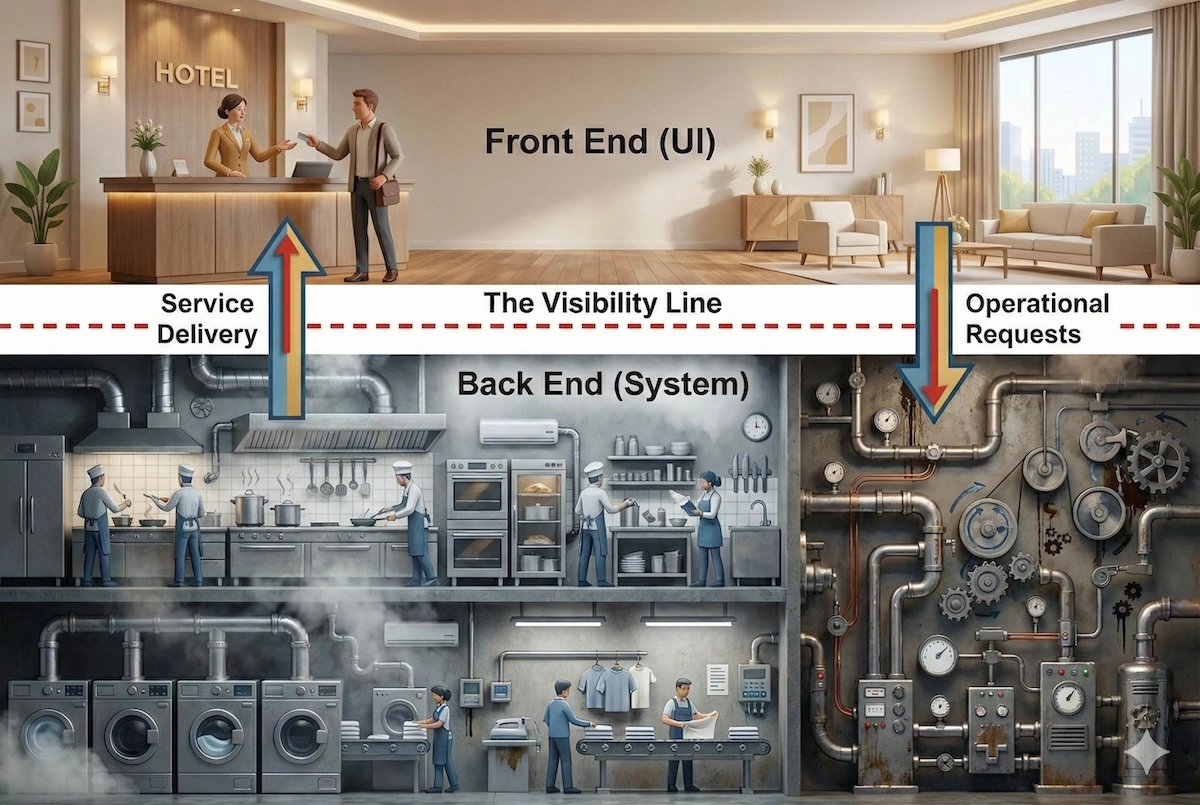
In systems design, the “User Interface” (Lobby) must be simple and clean, abstracting away the complex “Backend Code” (Operations) required to run it.
When this line is breached—like seeing a housekeeping cart in the lobby—the illusion of the ‘perfect experience’ is broken.
Designing the Next Generation of Guest Experiences
Hospitality and engineering may seem like distant fields, but at their core, both aim to solve problems and improve lives. The difference lies in the medium — one focuses on human comfort, the other on technical precision. Yet when these worlds come together, the result is transformative.
By applying system design principles, future hoteliers can build environments where every detail — from the lighting in the lobby to the timing of room service — works together in harmony. This integration of empathy and efficiency defines the future of the hospitality industry.
As SHMS continues to prepare students for this evolving landscape, understanding the language of engineering will become just as important as understanding the art of service. The perfect guest experience, after all, isn’t an accident — it’s engineered.
******************************
This article provides general educational guidance only. It is NOT official exam policy, professional academic advice, or guaranteed results. Always verify information with your school, official exam boards (College Board, Cambridge, IB), or qualified professionals before making decisions. Read Full Policies & Disclaimer , Contact Us To Report An Error
